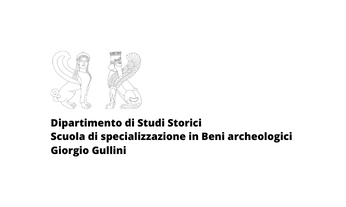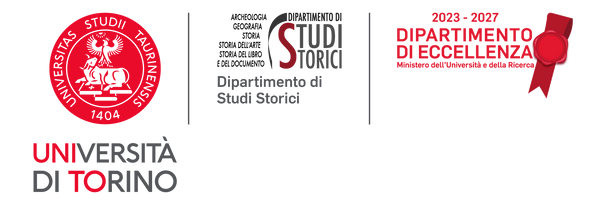ArcheoFOSS 2023
ArcheoFOSS XVII 2023. International conference on Open software, hardware, processes, data and formats in archaeological research.
Update 12/12/2023: The conference is being broadcasted via Webex, at:
- Tue 12 December 2023:
https://unito.webex.com/unito-en/j.php?MTID=ma1948d056877d33f4d36afab17f253b1 - Wed 13 december 2013:
https://unito.webex.com/unito-en/j.php?MTID=m95420b7516244ba47cd4ee020746694e
We are very happy to publish the definitive conference programme of ArcheoFOSS 2023, to be held in Turin and online on 12-13 December 2023. The online platform will be announced soon.
Please, feel free to contact us anytime by sending an email at callforpaper@archeofoss.org.
📋 Download the ArcheoFOSS 2023 programme in PDF (last update 2023-12-02)
➡️ CONFERENCE REGISTRATION FORM
ArcheoFOSS 2023 is hosted by the Dipartimento di Studi Storici and the Scuola di specializzazione in Beni archeologici Giorgio Gullini of the Università di Torino, with the contribution of Direzione Generale Educazione, Ricerca e Istituti Culturali. Ministero della Cultura.




Venue
Department of Historical Studies, University of Turin Palazzo Nuovo, Via Sant’Ottavio 20, Torino Aula Terracini (Ground floor)
12 December 2023
- 9.00 Greetings Gianluca Cuniberti, Vito Messina
- 9.15 Introduction Anna Maria Marras, Rosina Leone, Alessio Palmisano
9.30-11.00 Plenary session
- Chiara Bonacchi, University of Edinburgh
- Elena Giglia, Open Science Unity, University of Turin
- Elena Marangoni, Oriana Bozzanelli, Wikimedia Italy, University of Turin
11.00-11.30 Coffee break
11:30-13:00 Round table of use and reuse of images and digital contents in Heritage, Marco Ciurcina, Stefano Costa, Emanuel Demetrescu, Gabriele Gattiglia, Piergiovanna Grossi, Anna Maria Marras, Augusto Palombini
13.00 – 14.00 Lunch break
14.00 – 16.00 Panel Session 1: Tools, objectives, users: state of art and future perspectives on the sharing of open data in archaeology, Valeria Boi, Mirella Serlorenzi.
- Data Opening in Archaeology: A Roadmap, Elena Calandra, Valeria Acconcia, Valeria Boi, Ilaria Di Cocco, Annalisa Falcone, Mirella Serlorenzi.
- Managing Archaeological Data for a Sustainable Governance of Heritage Francesca Anichini, Antonio Campus, Gabriele Gattiglia, Antonella Rosa Saponara.
- The DSC authority file: a link between fieldwork and finds, Stefano Costa, Eleonora Fornelli, Anna Lorenzatto, Gennaro Iovino, Chiara Panelli, Fiorenza Proto, Renata Esposito.
- Does not compute! Accounting for social and situated experiences while integrating and analyzing obsidian sourcing data, Zachary Batist.
- An easy and open way to publish geographical open dataset from QGIS to Kepler.gl: the MirrorLab WebGIS case study, Francesco Freddolini, Vincenzo Maria Lacolla, Saverio Giulio Malatesta, Maria Onori, Antonio Pugliano, Paolo Rosati.
- Entertainment buildings in the roman empire: a quantitative approach, Lucia Marsicano, Marco Montanari, Open History Map.
- Sharing (Linked) Open Data with domain-specific data-driven community hubs on the example of the German National Research Data Infrastructure (NFDI) consortium NFDI4Objects and the data hub archaeology.link, Florian Thiery, Allard Mees
16.00 -16.30 Coffee break
16.30 – 17.30 Panel session 2: Archaeo.social: archaeology in the Fediverse and the future of scholarly social media, Joe Roe, Zack Batist
- Media deconvergence and digital public archaeology, Lorna-Jane Richardson
- On the pessimistic side: Is the fediverse a viable alternative to X for Spanish researchers? María Coto-Sarmiento
- Making and Breaking: Anarchist Praxis, Archaeological Communities, and Social Media, Judit del Río, Aris Politopoulos, Colleen Morgan
17.30-19.00 Galleria Archeologica- Musei Reali
13 December
9.00- 11.00 Panel session 3: The Roadmap to Cooperation and Transparency: Fostering Open Science Solutions in Archaeology, Alessio Palmisano, Andrea Titolo
- The Good, the Bad and the Ugly: Evaluating Open Science Practices in Archaeology, Alessio Palmisano, Andrea Titolo.
- The (open) BE-ARCHAEO database: a tool for interdisciplinary research on archaeological sites, Monica Gulmini, Vincenzo Lombardo.
- Citizen archaeology with Sardinia mining communities: an experimental action research policy to enhance mining heritage protection through 3D scanning intiatives, Mattia Sanna Montanelli; Pietro Francesco Serreli.
- Harmonizing Photogrammetric Approaches for Cultural Heritage Preservation: A Methodological Framework and Comparative Analysis, Vittorio Lauro, Vincenzo Lombardo.
- Dealing with doubts: Site georeferencing in archaeology and in the geosciences, Florian Thiery, Stefanie Baars, Fiona Schenk.
- Using Kart and GitHub for versioning and collaborating with spatial data in archaeological research, Andrea Titolo, Alessio Palmisano.
- Remote sensing with Open-Source systems. The open architecture of the UAVIMALS prototype and its application in the archaeological context of Cencelle (Tarquinia, Italy), Federica Vacatello, Andrea Vannini.
11.00- 11.15 coffee break
11.15-13.30 Panel session 4: Virtual Reconstruction in Archaeology with FOSS methods and tools, Emanuel Demetrescu, Simone Berto
- Metaverse and “the italian job”: closed and open models of virtual worlds in cultural heritage domain, Augusto Palombini
- From GIS to BIM. The 3D archaeological map of Altinum (Italy), Eleonora Delpozzo.
- Theoretical-Methodological Report on the Construction of Artificial Archaeological Sites: The Abade Case Study, Diogo Menezes Costa.
- Virtual recreation as a valid scientific representation for raising public awareness, Pablo Sicre-González, José Ortiz.
- An Open Look to the Past: Virtual and Immersive Approach to Study Inquisitorial “Autos de Fe” in Colonial Mexico and Guatemala, Antonio Rodríguez Alcalá, John F. Chuchiak IV, Zoraida Raimúndez Ares, Maria Felicia Rega, Luis Díaz de León, Hans B. Erickson.
- EBVRVM - Eboli in VR. Valorizzare un sito archeologico mediante 3D: il caso studio delle fornaci di Eboli, Edoardo Baiocchi, G. Chellini, S. Lucatelli, Saverio Giulio Malatesta, Sara Gonizzi Barsanti.
- Extended Matrix Narratives: teaching and engaging through the past, Paola Frigerio, Caterina Previato, Emanuel Demetrescu
- The Mount Nebo virtual archaeological park: a reconstruction of the Deacon Thomas Church, Sara Fabbri.
- Engaging the Public: Reviving History Through the Social Simulacra Model in Participatory Public History Projects, Lorenzo Gigli, Marco Montanari, Lucia Marsicano.
13.30 – 14.30 Lunch break
14.30 – 15.45 Panel Session 5, Small Finds: comparing methodologies and techniques for the 3D scanning of small objects, Daniele Bursich, Dario Calomino
- Digital twins of musealized archaeological finds: open source technologies applied to 3D scanning. Methodologies, limits and results, Sara Airò, Alessandro Bezzi, Luca Bezzi, Rupert Gietl, Cicero Moraes, Giuseppe Naponiello, Andreas Putzer.
- Non-invasive methodologies for the study of mineralized textile traces in Iron Age contexts, Emanuela Faresin, Vanessa Baratella, Margarita Gleba.
- Data extraction from 3D scanning: post-processing filtering for analytic and informative 3D models of small archaeological finds, Filippo Diara.
- Small find 3D survey for project Arcoa (ArCOA. Archivi e Collezioni dell’Oriente Antico), Luca Peyronel, Tatiana Pedrazzi, Daniele Bursich.
15.45 – 16.00 Coffee break
16.00 - 17.00 Panel Session 6, Data Integration and Communication Platforms/ Bridging the Gap: Platforms for Public Archaeology and Storytelling, Marco Montanari, Lucia Marsicano
- Zotero2Map - a new ITC tool for sharing and publishing bibliographic data with a cartographic base for historical-archaeological research, Eleonora Iacopini
- Simplifying contextualization of 3D model archives in WebGIS: 3DModelCommons, Marco Montanari, Lucia Marsicano
- Amplifying Archaeological Outreach: The Impact of Wikipedia and Collaborative Initiatives on Cultural Tourism, Piergiovanna Grossi
17.00 – 18.00 Conclusion
Organizing committee: Rosina Leone, Anna Maria Marras, Vito Messina, Alessio Palmisano.
Scientific committee: Julian Bogdani, Paola Buzi, Elena Calandra, Stefano Costa, Emanuel Demetrescu, Benjamin Ducke, Gabriele Gattiglia, Saverio Giulio Malatesta, Anna Maria Marras, Paola Moscati, Augusto Palombini.